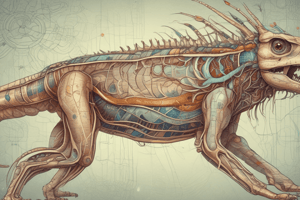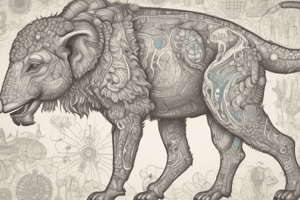Podcast
Questions and Answers
What is animal physiology?
What is animal physiology?
The study of the functions and mechanisms of living organisms.
Why is understanding cellular processes crucial in animal physiology?
Why is understanding cellular processes crucial in animal physiology?
Cellular processes form the basis of all life, including respiration, cell division, and osmoregulation.
How do organs and systems contribute to the physiology of animals?
How do organs and systems contribute to the physiology of animals?
Organs and systems, such as digestive, respiratory, circulatory, nervous, and endocrine systems, work together to maintain life.
Define homeostasis in the context of animal physiology.
Define homeostasis in the context of animal physiology.
Why is it important for animals to maintain homeostasis?
Why is it important for animals to maintain homeostasis?
What are some examples of systems in animals that work together to maintain life?
What are some examples of systems in animals that work together to maintain life?
What is the difference between ectothermy and endothermy?
What is the difference between ectothermy and endothermy?
How does the spiral-shaped cochlea in the inner ear of mammals contribute to their physiology?
How does the spiral-shaped cochlea in the inner ear of mammals contribute to their physiology?
Describe the role of the digestive system in mammals.
Describe the role of the digestive system in mammals.
What are some adaptations that enable birds to fly?
What are some adaptations that enable birds to fly?
How do marine mammals like seals and whales adapt to diving?
How do marine mammals like seals and whales adapt to diving?
Why is studying animal physiology important?
Why is studying animal physiology important?
Study Notes
Exploring Zoology: The Study of Animal Physiology
Zoology, a field that delves into the diverse world of animals, encompasses a wide variety of topics, including their behavior, evolution, and, most importantly, their physiology. In the realm of physiology, we delve into the inner workings of animals—their organs, systems, and processes that allow them to survive and thrive in their respective habitats.
The Basics of Animal Physiology
Animal physiology is the study of the functions and mechanisms of living organisms. It investigates how animals regulate their internal environment and maintain homeostasis, the balance of physiological processes that ensure survival. At the core of animal physiology lie several fundamental concepts:
- Cellular processes: The basis of all life is the cell, and understanding cellular processes such as respiration, cell division, and osmoregulation is crucial to understanding the physiology of animals.
- Organs and systems: Animals are complex organisms composed of numerous organs and systems, including the digestive, respiratory, circulatory, nervous, and endocrine systems. These systems interact and work together to maintain life.
- Homeostasis: This concept refers to the maintenance of a stable internal environment. Animals must regulate their internal conditions, such as body temperature, blood sugar levels, and oxygen concentrations, to survive.
Adaptations and Evolutionary Significance
Many of the physiological adaptations animals exhibit are a result of evolutionary pressures, allowing animals to survive and thrive in a variety of environments. Some examples of physiological adaptations include:
- Ectothermy (cold-bloodedness): Some animals, like reptiles and fish, have a body temperature that is regulated by their environment. This allows them to conserve energy since they do not need to produce heat.
- Endothermy (warm-bloodedness): Other animals, such as birds and mammals, have the ability to regulate their body temperature internally. This allows them to maintain a constant body temperature, enabling them to be active in a wide range of environments.
- Peculiarly shaped organs: Some animals have organs that are shaped in ways that allow them to perform specific functions, such as the spiral-shaped cochlea in the inner ear of mammals, which allows them to detect sound frequencies.
Examples of Animal Physiology
To further illustrate the versatility of animal physiology, let's consider a few examples:
- Mammalian digestive system: Mammals have a specialized digestive system that contains several organs, including the stomach, small intestine, and large intestine. These organs work together to break down food and absorb nutrients.
- Avian flight: Birds have a series of adaptations that allow them to fly, including strong, lightweight bones, feathers, and a streamlined body shape. Their respiratory and circulatory systems also work in tandem to supply their muscles with oxygen, allowing them to maintain flight for extended periods.
- Marine mammal diving: Marine mammals, such as seals, sea lions, and whales, have specialized physiological adaptations that allow them to dive to great depths. These adaptations include a thick layer of blubber, which acts as insulation and a store of energy, and the ability to store oxygen in their muscles and blood.
Conclusion
Zoology, particularly animal physiology, is a vast and fascinating field that explores the inner workings of animals. By studying the physiological adaptations and processes of animals, we can better understand their biology, evolution, and ecology. This knowledge is essential for conservation efforts, medical research, and the development of new technologies. As we continue to explore and better understand the world of animals, we gain a deeper appreciation for their complexity and resilience.
Studying That Suits You
Use AI to generate personalized quizzes and flashcards to suit your learning preferences.
Description
Delve into the intricate world of animal physiology through the lens of zoology. Explore topics such as cellular processes, organs and systems, homeostasis, physiological adaptations, and evolutionary significance in animals.




